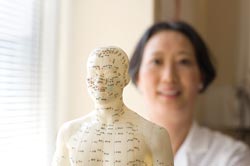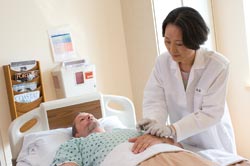
Adeline Ge, M.D., O.M.D.
Senior Chinese Medicine Acupuncture Consultant
NIH
Photo: NCCAM
Acupuncture intrigued Charles White. The 66-year-old cancer patient from southern Maryland thought it might lessen his pain, and reduce the nausea and fatigue from his pain medications and chemotherapy. But he wasn't sure.
Then he enrolled in an acupuncture study at the Clinical Research Center at the National Institutes of Health (NIH) in Bethesda, Maryland. Now he's convinced. "I always feel better—less in need of pain medications—after I've had acupuncture," says White. He feels calmer and less fatigued, too.
His acupuncturist is Adeline Ge, M.D., O.M.D. a Senior Chinese Medicine Acupuncture Consultant at NIH. She says, "Acupuncture can control or stop some symptoms which lessen quality of life, even some medical problems conventional care cannot help."
Acupuncture is one of the oldest healing practices in the world. It originated in Asia more than 2,000 years ago. According to the 2007 National Health Interview Survey, an estimated 1.4 percent of U.S. adults use acupuncture.
What Is Acupuncture?

Dr. Adeline Ge adjusts placement of acupuncture needles in the hand of a patient at the NIH Clinical Research Center.
Photo: NCCAM
- Acupuncture aims to restore and maintain health through the stimulation of specific points on the body. An acupuncturist places thin needles in these points in the body that lie along pathways known as meridians.
- Acupuncturists, as well as some physicians, dentists, chiropractors, and other health care professionals, practice acupuncture.
- Most people feel little or no pain during acupuncture. Some feel energized by treatment; others feel relaxed.
- Acupuncture is used for a wide range of conditions, from arthritis and low back pain to infertility. Scientific evidence suggests it may be helpful for some conditions, but not for others.
Research on Acupuncture
Over the past 10 years, NCCAM has supported extensive research on acupuncture. Studies have looked at its effect on specific health conditions and how it affects the brain and nervous system; the neurological properties of meridians and acupuncture points; and methods for improving the quality of acupuncture research.
Recent studies have found that acupuncture:
- Helps alleviate nausea in cancer patients undergoing chemotherapy.
- Relieves pain and improves function for some people with osteoarthritis of the knee and complements standard medical care.
- Helps in treating chronic lower back pain.
- Can be useful in treatment of post-traumatic stress disorder (PTSD) symptoms.
- May improve pregnancy rates following in vitro fertilization (IVF).
- May or may not be of value for many other conditions, including irritable bowel syndrome and some neurologic disorders.
